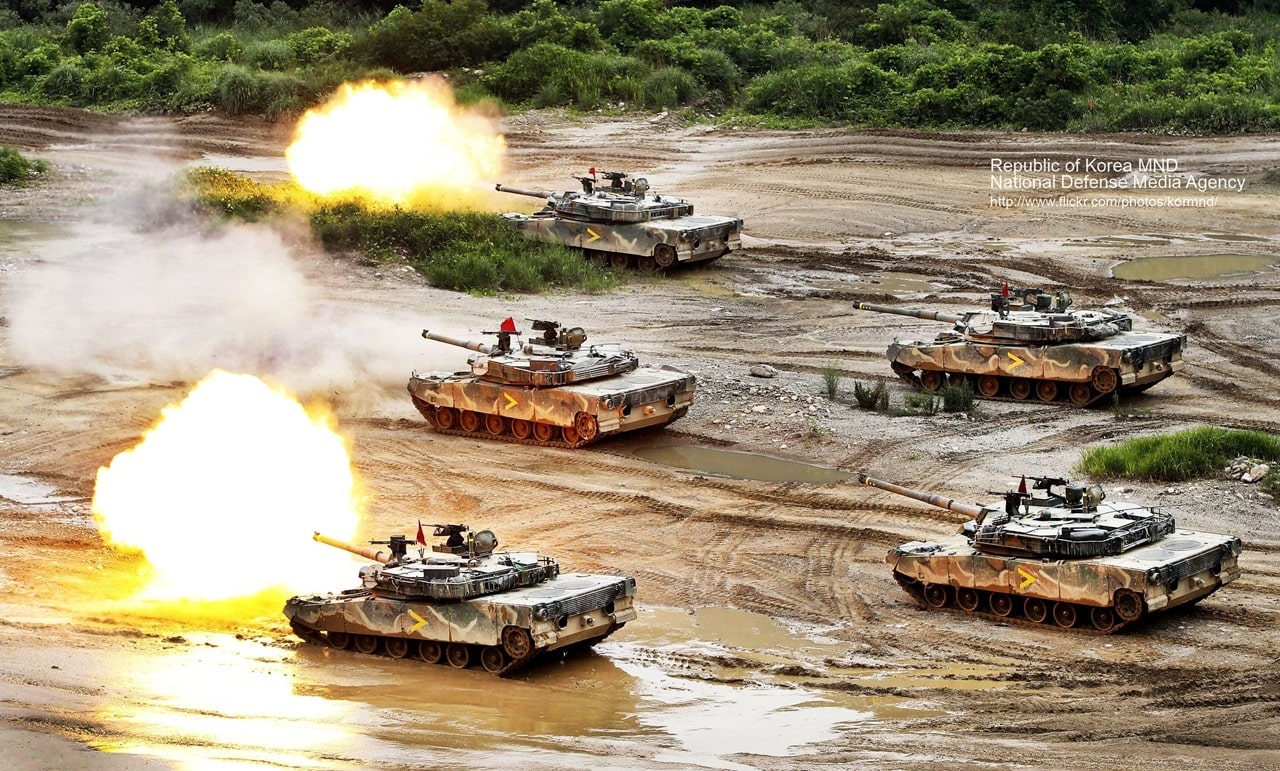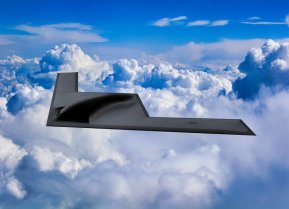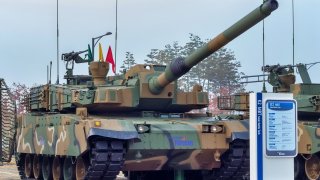K2 Black Panther: One Of the Best Tanks on Earth (Made in South Korea)
The K2 Black Panther is the most expensive tank on Earth for a simple reason: it might just be the best tank on Earth.
South Korea's K2 Black Panthers Are Among the Best MBTs in the World - While there may be disagreement on what is the "best" main battle tank (MBT) in service, the short list includes the German Leopard 2, the British Challenger 2, and the U.S. M1 Abrams. At the same time, the Russian T-90 and T-14 Armata could also be considered.
Then there is the South Korean K2 Black Panther.
Considered among the best – and possibly better than any others – it is also noted for being the most expensive MBT produced to date, with each reportedly costing around $8.5 million.
As Harrison Kass previously reported for The National Interest, "Each unit thus represents a significant investment in South Korean defense capabilities. Hyundai, better known for its mid-to-low-priced cars, manufactures the K2. But the K2 is no Hyundai Santa Fe. This is a serious, cutting-edge piece of technology – the world's first and only fourth-generation battle tank."
It was in June 2023 that Seoul approved the production of another run of K2 Black Panthers in a deal worth an estimated 1.94 trillion won ($1.46 billion). It was the fourth round of mass production of the MBT, TheDefensePost reported.
It might seem surprising that South Korea, which has become one of the most successful democracies in Asia, developed such a tank and is investing so heavily in it. But there is a good reason – namely, North Korea.
South Korea's Tank Force
During the Korean War, the first tanks deployed by the United Nations forces were the American M24 Chaffee light tanks. Not unexpectedly the M24s fared poorly against North Korea's Soviet-built T-35-85s. Following the war, the South Korean military bolstered its armored fleet with a variety of U.S.-made tanks, but attempts made to obtain the M60A1 Patton main battle tanks (MBTs) in the 1970s ended in failure.
Always fearing that its neighbor to the north would launch an attack across the DMZ, South Korea took matters into its own hands and developed a domestically produced tank – the K1, which was based on the early designs of the American XM1 program that led to the development of the M1 Abrams. The new South Korean-made tank entered service in the late 1980s and it has been steadily improved, with the K1A2 entering service in 2013.
However, Seoul has moved forward with an entirely new design: the K2 Black Panther, a next-generation MBT developed by the South Korean Agency for Defense Development and manufactured by Hyundai Rotem. The K2 was meant to complement – rather than replace – the K1 series that is currently fielded by the South Korean military.
The K2 was developed utilizing indigenous technology only, and the first prototype was unveiled in 2007, while production commenced for the first 100 K2 tanks in 2014. It is considered one of the most advanced MBTs in the world, outclassing any tanks in service with North Korea or even China.
It relies on both an undisclosed modular composite armor and Explosive Reactive Armor (ERA) blocks, and according to reports can withstand direct hits to the front from a 120mm tank round. In addition, the K2 also is equipped with an active protection system as well as countermeasure systems that include NBC (nuclear-biological-chemical) protection.
It is a Heavy Hitter
The K2 Black Panther MBT has a crew of three including a commander, gunner, and driver. The MBT's main armament is a Rheinmetall 120mm L/55 smoothbore gun, produced under license in South Korea and equipped with a domestically-designed automatic loader – which can ensure the loading of projectiles on the move including when on uneven surfaces. The 120mm gun can reportedly fire approximately 10 to 15 rounds per minute. It can be used with a variety of munitions and is compatible with all standard NATO tank rounds. The 120mm L/55 gun is also capable of firing the new KSTAM (Korean Smart Top-Attack Munition) rounds – smart target-activated fire-and-forget projectiles.

Secondary armament of the Black Panther includes a 12.7mm heavy machine gun and a 7.62mm machine gun.
South Korea's next-generation tank is equipped with domestically-developed auto auto-target detection and tracking system, which incorporates a hunter-killer function. The tank also features an electric gun and turret driving system (28-260VDC) provided by Doosan Corporation Mottrol. In addition, the gunner's primary sight (GPS) and commander's panoramic sight (CPS) are stabilized in two axes, and include a thermal imager and laser rangefinder enabling day/night observation.
K2 Suspension System
While not as speedy as its namesake, the Black Panther can still hunt down its slower-moving prey thanks to its license-built MTU MB 883 Ka501 diesel engine, which produces 1,500 horsepower. It can reach a top speed of 43 mph on the road, and 31 mph cross country. There is also an auxiliary gas turbine power unit, offering 400 horsepower.
The tank also is equipped with a unique suspension system, which can be contorted into a variety of positions. For cross-country performance, the suspension is raised, providing the K2 greater ground clearance, while on roads, the suspension is lowered, hugging the ground for better speed. In addition, the K2 can "lean," "sit" or "kneel" to provide the main gun better maneuverability in hull-down positions. When leaning backward, the K2 can raise its main gun to target low-flying aircraft or to better target more highly elevated targets on the Korean Peninsula's hilly terrain. The K2 even can lean to the left or the right, which improves maneuverability when driving along slopes.
Exporting the K2 Black Panther
Even though Seoul is currently adopting the tank for its domestic use, the tank has caught the eye of foreign buyers, including the Norwegian Defence Materiel Agency (NDMA), which announced that it would put the K2 up against the German-made Leopard 2A7 in tests to determine Norway's next MBT.
Last December, Cairo also announced that it was in negotiations with South Korea to co-produce a version of the Black Panther for use by the Egyptian Army. Trade between Egypt and South Korea has increased in recent years and reached nearly $2 billion in 2020 in engineering and electrical goods, furniture, clothes, chemical products, fertilizers, and medical industries. Seoul has also invested some $570 million into 181 projects in Egypt, including construction, information technology, tourism, and agriculture. Now Cairo is looking to Seoul for military hardware and that will likely include the K2 Black Panther.
However, the biggest foreign buyer of the South Korean MBT has been Poland.
In December 2022, the first batch of K2 Black Panther MBTs and K9A1 Thunder self-propelled howitzers (SPHs) arrived at the Polish port city of Gdynia.
Polish President Andrzej Duda was joined by Defense Minister Mariusz Blaszczak at an official ceremony that marked the arrival of the military hardware. While taking delivery, the Polish leader hailed the swift implementation of a $5.8 billion deal that had only been signed last summer. Per the terms of the deal, South Korean-based Hyundai Rotem will supply Poland with 180 K2 MBTs by 2025 – and the delivery will also include a training/logistics package along with ammunition for the tanks.
During the second stage of the framework agreement, Warsaw is expected to receive 820 K2PL tanks, which will be manufactured within a framework of the Polish-Korean industrial cooperation, while a broad transfer of technologies is expected to occur. South Korea has become an Asian arms powerhouse, and Poland has become one of its best customers.
As The Diplomat reported in April 2023, the K2 Black Panther's introduction to Europe could be seen as a potential game changer for the balance of power on the ground in Europe and one that has potentially serious implications for Russian security. It also highlights how South Korea is slowly transforming into a global arms exporter – offering truly one of the best tanks in service today.
Author Experience and Expertise
Peter Suciu is a Michigan-based writer. He has contributed to more than four dozen magazines, newspapers, and websites with over 3,200 published pieces over a twenty-year career in journalism. He regularly writes about military hardware, firearms history, cybersecurity, politics, and international affairs. Peter is also a Contributing Writer for Forbes and Clearance Jobs. You can follow him on Twitter: @PeterSuciu.
Image Credits: Creative Commons.


